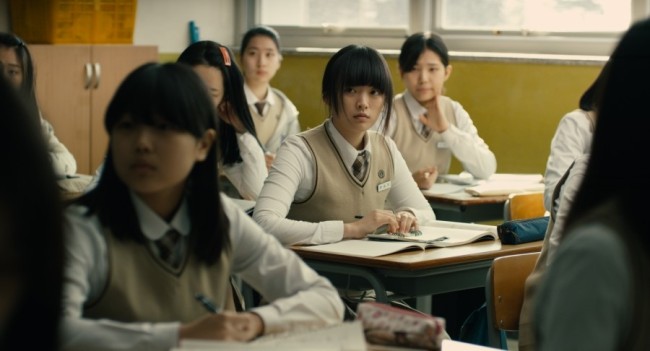뉴스속보 상세보기
There is no doubt that filmmaker Lee Su-jin’s feature debut “Han Gong-ju” is a rare cinematic achievement.
It is visually and textually strong, musically appealing, and deals with its difficult subject matter ― a story about a teenage gang rape victim ― with sensitivity and nuance.
Yet its artistic accomplishments aside, including seven trophies from Rotterdam, Marrakech, Busan and Deauville, one question remains to be answered: Can we separate this film from the real-life 2004 Miryang gang rape case, in which 44 male high school students in Miryang, Gyeongsang Province, raped three middle school girls and two high school girls on multiple occasions over a year?
“Han Gong-ju” isn’t the first Korean film to have dealt with teenage rape victims since the 2004 incident. Kim Yong-han’s 2012 crime drama “Don’t Cry, Mommy,” inspired by the 2004 case, was about a mother’s revenge against the rapists that attacked her daughter, who had committed suicide.
Lee Chang-dong’s 2010 film “Poetry” was about an old, impoverished woman who learns her teenage grandson was involved in the gang rape of a school girl in her rural town. The victim in Lee’s film, too, reacted by jumping off a bridge to her death.
Han Gong-ju, the film’s protagonist, played impeccably by Chun Woo-hee, does not end her life. Instead, she learns how to swim. After practically being forced to leave her hometown where the attack took place, she starts a new life in a new city.
 |
| A scene from Lee Su-jin’s “Han Gong-ju.” (CGV Movie Collage) |
Images of water and Gong-ju’s mouth, while struggling not to drown, are deftly woven into the film’s non-linear narrative ― where flashbacks reveal her traumatic past, including Gong-ju’s friend, another rape victim, jumping off a bridge. In the scene, Gong-ju helplessly watches her friend’s dead body being pulled out of the water. For her, both literally and metaphorically, life is either sink or swim. What fills the screen is her willingness to live, not her despair.
One of the most impressive achievements of the film is Chun’s performance as Gong-ju, who is resilient, hopeful and talented ― her noticeable talent in music leads to another tragedy in the film ― while clearly tormented by her secret.
Chun never overplays the role; she never gets explosive with her emotions. The actress’ understated performance, however, adds important resonance to the film, when she does little things on her own, such as singing alone in the shower, cleaning her desk, and playing her guitar in an empty classroom.
“Han Gong-ju” does not openly state that it was inspired by the 2004 incident. But the correlations between the film and case are undeniable. When Eun-hee, Gong-ju’s friend at her new school, asks her if she’s ever been kissed ― a typical teenage moment ― Gong-ju, after a painful pause, says she has been some 40 times, which tallies with the number of offenders in the real-life Miryang case.
The unjust indignity Gong-ju suffers because of the senseless and shameless parents of the rapists, as well as her alcoholic father ― whose self-interest is more important to him than the safety and dignity of his daughter ― are all inevitably reminiscent of the stories of the victims in the Miryang case, some of whom could not finish school and went missing.
Regardless of its obvious cinematic achievement, it’s questionable whether the real-life victims, whose rapists threatened to upload video footage of the assault online, would have agreed to the existence of this film, as well as its reconstruction of the hard-to-watch crime.
By Claire Lee (dyc@heraldcorp.com)


